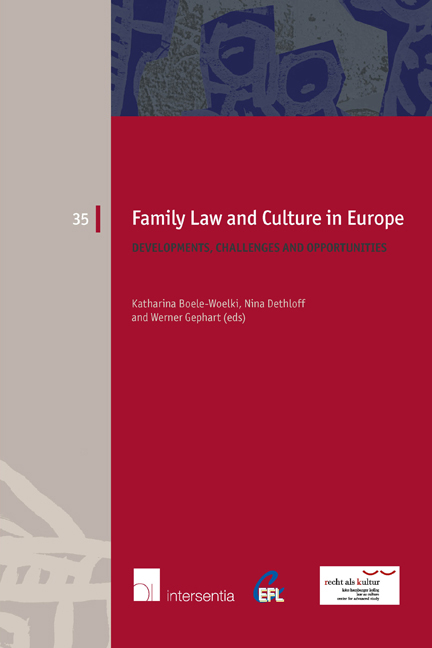Book contents
- Frontmatter
- Preface
- Contents
- List of Authors
- PART ONE THE CEFL PRINCIPLES ON PROPERTY RELATIONS BETWEEN SPOUSES
- PART TWO BREAKUP OF (NON-)FORMALISED RELATIONSHIPS
- PART THREE NEW CONCEPTS OF PARENTAGE
- PART FOUR INTERNATIONAL FAMILY RELATIONSHIPS
- The Proposal for a Regulation on Matrimonial Property: A Critique of the Proposed Rule on the Immutability of the Applicable Law
- ‘Habitual Residence’ in European Family Law: The Diversity, Coherence and Transparency of a Challenging Notion
- New Approaches to Same-Sex Marriage: The End of Nationality as a Connecting Factor?
- Protection Orders across Europe: First Remarks on Regulation No. 606/2013
- PART FIVE TRANSNATIONAL FAMILIES: ACROSS NATIONS AND CULTURES
- EUROPEAN FAMILY LAW SERIES
New Approaches to Same-Sex Marriage: The End of Nationality as a Connecting Factor?
from PART FOUR - INTERNATIONAL FAMILY RELATIONSHIPS
Published online by Cambridge University Press: 22 November 2017
- Frontmatter
- Preface
- Contents
- List of Authors
- PART ONE THE CEFL PRINCIPLES ON PROPERTY RELATIONS BETWEEN SPOUSES
- PART TWO BREAKUP OF (NON-)FORMALISED RELATIONSHIPS
- PART THREE NEW CONCEPTS OF PARENTAGE
- PART FOUR INTERNATIONAL FAMILY RELATIONSHIPS
- The Proposal for a Regulation on Matrimonial Property: A Critique of the Proposed Rule on the Immutability of the Applicable Law
- ‘Habitual Residence’ in European Family Law: The Diversity, Coherence and Transparency of a Challenging Notion
- New Approaches to Same-Sex Marriage: The End of Nationality as a Connecting Factor?
- Protection Orders across Europe: First Remarks on Regulation No. 606/2013
- PART FIVE TRANSNATIONAL FAMILIES: ACROSS NATIONS AND CULTURES
- EUROPEAN FAMILY LAW SERIES
Summary
The use of nationality and domicile as a connecting factor for private international law questions over same-sex relationships has already been abandoned in Belgium and the Netherlands, whenever such use would deny giving effect to a same-sex marriage. Recent French developments mark a further remarkable shift away from its use as a means to determine personal law. Finally, England may find itself forced to reconsider its approach to the use of domicile as a connecting factor, once the implications of its new law on same-sex marriage are properly understood.
INTRODUCTION
In the United States, the approach taken by the courts in determining the validity of a marriage from another state is generally to presume validity if the necessary conditions, both as to form and capacity, are fulfilled under the law of the state where the marriage was celebrated, the lex loci celebrationis. Rebutting this presumption depends on a properly formulated application of the public policy exception. This causes tensions where an increasing number of US jurisdictions now permit same-sex marriages, whilst others remain vehemently opposed. Section 2 of the Defense of Marriage Act 1996 confuses matters as it purports to enshrine a right not to recognise an out-of state same-sex marriage, but this does not override the basic principle that the refusal needs to be based on a legitimate use of the public policy exception. The debate on the scope and nature of this exception, and the limits which may be imposed on its use by US constitutional protections, has been continuing for many years.
European jurisdictions, on the other hand, need not always invoke a public policy exception to refuse recognition to an otherwise valid foreign same-sex marriage. Frequently, their private international law rules provide an additional peg on which to hang a refusal. The formal validity of a marriage still depends on adherence to requirements in the place of celebration, but questions as to the capacity of the parties to marry are governed by each individual's ‘personal law’, usually the law of his or her nationality or domicile.
- Type
- Chapter
- Information
- Family Law and Culture in EuropeDevelopments, Challenges and Opportunities, pp. 263 - 276Publisher: IntersentiaPrint publication year: 2014

